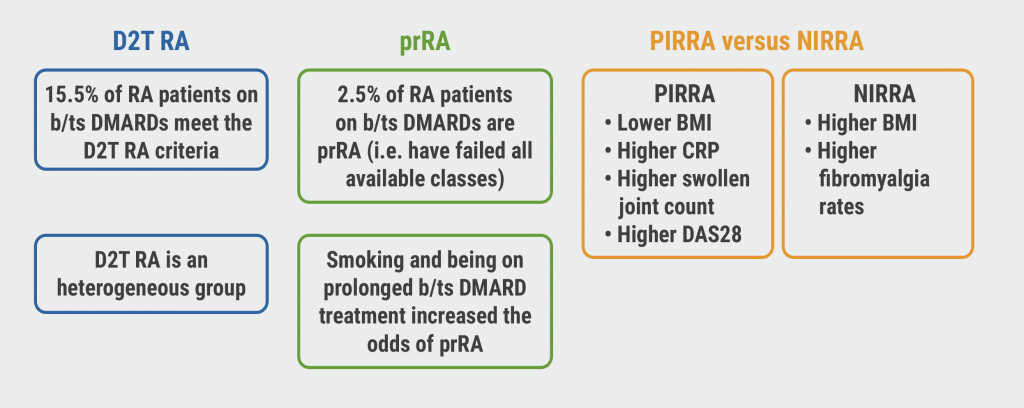https://doi.org/10.55788/d4177b17
The IL-17A and IL-17F inhibitor bimekizumab was evaluated for long-term safety and efficacy in the treatment of active psoriatic arthritis up to week 52 after demonstrating positive results at week 16 in phase 3 BE OPTIMAL trial (NCT03895203). The study included 852 patients, randomised 2:3:1 to placebo, bimekizumab 160 mg every 4 weeks, or adalimumab 40 mg every 2 weeks as the active reference group [1]. After week 16, an open-label phase started, and participants of the placebo and the bimekizumab group were treated with the study drug, while in the reference arm, medication with adalimumab remained unchanged.
The baseline features of the study cohort included a mean age of 48.7 years and 46.8% of men. Prof. Christopher Ritchlin (University of Rochester Medical Center, NY, USA) further highlighted that 58% of participants were on concomitant use of methotrexate, around half had at least 3% of psoriasis-affected body surface area, between 24.9% and 33.2% had enthesitis, and 7.9% to 13% had dactylitis. “Over 89% of patients completed week 52, with a low number of discontinuations due to treatment-emergent adverse events (TEAE) or lack of efficacy,” Prof. Ritchlin pointed out.
After 1 year, an ACR50 response was achieved by 54.5% of participants on continuous bimekizumab, 53% of those who received placebo in the first 16 weeks and then switched to bimekizumab, and 50% of participants in the reference arm. The results for Psoriasis Area and Severity Index (PASI)100 were 60.8%, 65%, and 48.5% for each arm, respectively. “We were somewhat surprised by the high PASI100 rates for adalimumab, but it is important to know that only 68 patients were in this arm, so that may have influenced this particular outcome,” Prof. Ritchlin commented. He further underlined that ACR20, ACR50, and ACR70 responses numerically increased from week 16 to week 52. After 1 year, minimal disease activity was present in 55% of participants on continuous bimekizumab, 53.7% of those receiving placebo/bimekizumab, and 52.9% of those treated with adalimumab. The radiographic progression inhibition was overall sustained in around 90% of all groups.
Comparing long-term safety between bimekizumab with the reference arm from weeks 0 to 52, the occurrence of any TEAE and serious TEAE was 79.1% versus 80.7% and 6.6% versus 7.1%, respectively. Nasopharyngitis, upper respiratory tract infections, and urinary tract infections were the most common TEAE on bimekizumab (12%, 7.1%, and 6.1%). “Oral candidiasis was observed in about 5% of the patients on bimekizumab, which is significantly higher than what we saw with adalimumab, not unexpectedly,” Prof. Ritchlin added.In his summary, he underlined that these results represent long-term efficacy and tolerability for bimekizumab in patients with psoriatic arthritis, naïve to prior biologic treatment.
- Ritchlin CT. Bimekizumab treatment in biologic DMARD-naïve patients with active psoriatic arthritis: 52-week efficacy and safety results from a phase 3, randomised, placebo-controlled, active reference study. L02, ACR Convergence 2022, 10–14 November, Philadelphia, USA.
Copyright ©2022 Medicom Medical Publishers
Posted on
Previous Article
« Stimulation of PD-1: a new concept to treat RA Next Article
Glucocorticoids in rheumatic diseases: Is there a skeletal sparing dose? »
« Stimulation of PD-1: a new concept to treat RA Next Article
Glucocorticoids in rheumatic diseases: Is there a skeletal sparing dose? »
Table of Contents: ACR 2022
Featured articles
Bruton’s tyrosine kinase inhibition: a novel treatment option for Sjögren’s syndrome?
Early treatment: a key to improved outcomes in polyarticular JIA
ACR 2022 Congress Round-Up
Glucocorticoids in rheumatic diseases: Is there a skeletal sparing dose?
Bimekizumab: Robust 1-year results in treating psoriatic arthritis
Stimulation of PD-1: a new concept to treat RA
Denosumab in erosive hand arthritis: Structure repair of interphalangeal joints seems possible
High retention rates after switching between infliximab biosimilars
New analysis assesses the safety of tofacitinib regarding extended MACE
Lack of vaccination results in a higher frequency of pre-term births in pregnant women with rheumatic disease and COVID-19
Ankylosing spondylitis: Combining biologics with NSAID does not imply reduced radiographic progression
Diet and exercise programme: a successful OA strategy in a community-based setting
Bruton’s tyrosine kinase inhibition: a novel treatment option for Sjögren’s syndrome?
A novel risk score helps identify interstitial lung disease in patients with systemic sclerosis
Early treatment: a key to improved outcomes in polyarticular JIA
TYK2 inhibition shows potential as a treatment for SLE
Belimumab efficacious in cutaneous lupus erythematosus
No increased cancer risk in patients with rheumatic diseases and prior malignancy treated with novel therapies
Related Articles

July 31, 2023
Poly-refractory RA: not common, but still present
July 17, 2024
Improving outcomes in pregnancy and psoriatic disease
© 2024 Medicom Medical Publishers. All rights reserved. Terms and Conditions | Privacy Policy
HEAD OFFICE
Laarderhoogtweg 25
1101 EB Amsterdam
The Netherlands
T: +31 85 4012 560
E: publishers@medicom-publishers.com

